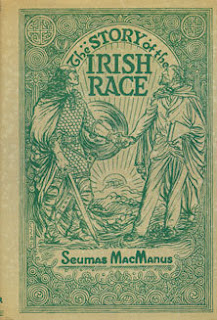February 17 is the feast of Saint Fintan of Clonenagh. I have previously brought Canon O'Hanlon's account of the miracles attributed to this great monastic saint here. Below is another of his contributions on Saint Fintan, this time wearing his other hat as 'Lageniensis', the poet. For the Canon was not just a hagiologist but also a folklorist, illustrator and poet. The Irish saints were the subjects of many amateur versifiers in the Victorian popular religious press, but Canon O'Hanlon's poems were issued in a collection printed by James Duffy and Company in Dublin in 1893. In it he combined all of his interests as the poems are not only inspired by the local folklore of his native County Laois but all of them are copiously annotated with references to saints, placenames and topography etc.
St. Fintan’s Road, a Legend of Clonenagh
The night-clouds were dark, holy Fintan returning,
Dun, dreary and dismal the prospect before,
As feebly he journeyed, foot-sore;
No bright lunar orb in the starless sky burning,
Soft yielding each step that morass scarce bore,
For quagmires had sprinkled it o’er.
“Dear grey abbey-walls,” said the saint while approaching,
“Oh, when shall I find your delightful repose,
On the fertile and grass-bearing knowes;
The tempest howls over on wild moss encroaching,
Tall pines of the wilderness bend as it blows,
And the danger more fearfully grows.
Pious peasants relate, how that tempest then ceasing
Unveiled the bright moon, from a covert of shade,
In all her true glories arrayed,
When a clear shining star, through the liquid air chasing,
Led on to his churches a road newly made,
And in calm were the soughing winds laid.
Even yet, at the lone hour of midnight returning,
Swains tread on with joy, o’er that causeway secure,
For their patron will safety insure;
Nor fear they if midnight be shadowed in mourning,
While telling their prayers, devoutly and pure,
To Fintan, the saint of that moor.
'St. Fintan’s Road, a Legend of Clonenagh' in The Poetical Works of Lageniensis (Dublin, 1893), 252-255.
Content Copyright © Omnium Sanctorum Hiberniae 2012-2022. All rights reserved.

